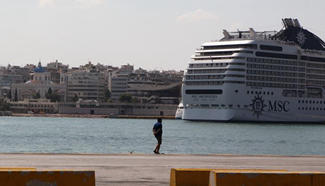
Tunisian Prime Minister Habib Essid speaks in the plenary session of the Assembly of People's Representatives, in Tunis, Tunisia, July 30, 2016. Tunisian Prime Minister Habib Essid on Saturday lost a confidence vote in parliament. (Xinhua/Adel Ezzine)
TUNIS, July 30 (Xinhua) -- With a stagnant growth rate of 0.4 percent in the first quarter of 2016, Tunisian President Beji Caid Essebsi proposed a national unity government to replace the one of Prime Minister Habib Essid.
Essid lost a confidence vote in parliament on Saturday, and President Essebsi's proposal for a new national unity government was seen by some observers as an indication for Essid to resign.
In a plenary session of the Assembly of People's Representatives, the Tunisian parliament, 118 deputies voted to dismiss the prime minister from office, while only three voted for him and 27 abstained.
The vote was demanded by the prime minister himself on July 20, as he initially refused to step down voluntarily, citing Article 98 of the Constitution, which gives the head of government the power to request a confidence vote in parliament. The government may continue its work if it win an absolute majority of 109 votes.
After the no-confidence vote, President Essebsi will nominate in 10 days a person to form the new national unity government, and the candidate will have one month to form a new Cabinet for parliamentary approval.
Some deputies told Xinhua that there is "thick fog" around the name of the potential candidate for prime minister.
MOST CONSTITUTIONAL CHOICE BY ESSID
Essid, a technocrat without any party background and used to be a close ally to Essebsi, has defended his government and expressed his shock about the timing chosen by the president to make the initiative of the new national unity government.
In an interview last week, Essid said the timing was "inappropriate" and admitted he was not informed by the president before the announcement of the initiative.
Nizar Makni, a political analyst, told Xinhua that Essid chose the "most constitutional process" to call for a vote of confidence in parliament which is dominated by Nidaa Tounes, a party founded by Essebsi in 2012, and the Islamic Ennahda party, a main ally to Nidaa Tounes.
"The prime minister has chosen the way the most politically sure, with less possible damage by avoiding the moral confrontation with the alliance in power and also with the presidency," he said.
In fact, the chance was quite "slim" for Essid to keep his position even before the vote, said Makni.
CALL FOR REFORM AMID SOCIO-ECONOMIC DIFFICULTIES
"The choice for the proposal of a national unity government ... is related to the country's general situation. The relation is quite obvious," said Kais Arguoubi, another political analyst.
Arguoubi told Xinhua that the proposal is related to negative socio-economic situations in Tunisia, especially its worsening investment environment, persistently high unemployment rates and deadly terrorist attacks.
Since March 2015, Tunisia has witnessed a series of terrorist attacks that killed more than 80 people, most of them were foreign tourists and Tunisian security forces.
Some economic experts have warned Tunisia of a socio-economic disaster.
The Tunisian dinar has fallen to its record lows against the euro and the U.S. dollar.
Meanwhile, the production of phosphate, a main industry of Tunisia, is almost paralyzed and some big foreign industrial companies instead chose Morocco, a major regional competitor of Tunisia, as a better substitute to conduct business.
Makni said President Essebsi tried to make a certain "artificial stability" in both fields of politics and the economics.
He explained that the president's initiative of the unity government involves two influential and powerful trade unions, namely the Tunisian General Labour Union and the Tunisian Confederation of Industry, Trade and Handicrafts.
"In the eyes of Essebsi, Essid is no longer the man of situation because of his incapacity to solve the social and economic problems, which also explains why Essebsi called on the two trade unions," Makni said.
"Personally, I think Essebsi wanted to redistribute his playing cards on the political chessboard of the country ... to ensure the disguised control over the executive power," he added.











